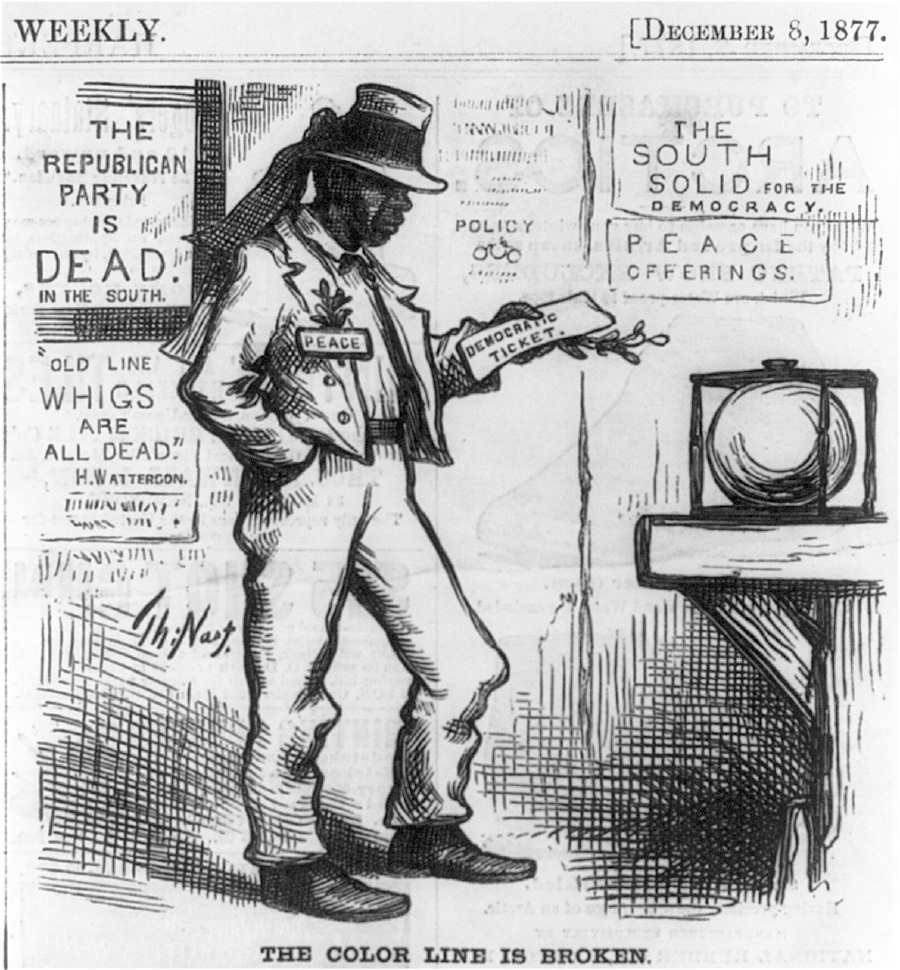History of American Voting
Black Suffrage
“We the people” really brings the idea of who the “we” is. For over a hundred years black Americans were denied their right to vote based strictly on race and condition of servitude. In some rare cases free black Americans were given the right vote, however, more than not it was denied. The Civil War was fought over states' rights and slavery. After the end of the Civil War, the thirteenth amendment, which made it illegal for anyone to own slaves, and also the fourteenth amendment which made all ex-slaves citizens of America brought forth the renewed question of who “We” is in “We the people”. It is important to analyze their struggle which still haunts us today.
Although slaves were never given the right to vote there were some northern states that allowed free blacks to the most basic voting rights. These states included Maryland, North Carolina, Pennsylvania, New York, Massachusetts, Vermont, and Tennessee but the freed blacks still had to be land owners, over twenty one. The voting rights are stripped from most black Americans in 1857 after the Supreme Court decision of Dred Scott v. Sanford. Scott was a slave that moved with his slave owner to Wisconsin Territory and Illinois where slavery was illegal according to the Northwest Ordinance of 1787. He began his suit in 1847 in Missouri State Court where he lost on a technicality. His 1850 retrial is herad by the Missouri Supreme Court and ruled that Scott and his wife were free. Through a process of trials and over turns the case finally went before the Supreme Court. The Supreme Court ruled “in a seven to two decision that blacks, whether they happen to be slave or free, are not citizens of the United States.” (DiClerico, p. 95) The Supreme Court decision thus removed the rights of voting blacks in America. It was not until the end of the Civil War and the passing of the thirteenth, fourteenth, and fifteenth amendments that the Scott decision is overturned. The thirteenth amendment (1865) abolished slavery. The fourteenth amendment (1868) made blacks American citizens. The fifteenth amendment (1870) gave blacks the right to vote.

After the end of the Civil War, President Andrew Johnson was more concerned with Reconstruction than with the rights of the newly freed slaves in the south. Johnson actually put proslavery governors in place in the southern states which in turn began to pass legislation that would limit blacks ability to exercise their newly attained rights. These laws became known as the black codes. The “Black Code” laws were passed in northern and southern states. In states like Illinois and Indiana state legislatures passed amendments to their constitutions to ban completely the immigration of blacks into their states. The southern states passed laws that forced blacks to have a job or pay a fine. If the person could not pay the fine he was then thrown back into slave like conditions in order to pay the fine. This guaranteed plantations owners the workers needed to maintain their crops. States passed laws that forbade slaves to own land thus depriving them of the possibility of independence and the ability to vote.
Radical southern whites began forming organizations that either forcibly denied blacks the right to vote through violence or forced them to vote for a particular candidate. In other states, literacy tests were put in place and given unfairly to stop black participation in voting. This practice by whites led to the formation of the Jim Crow laws. A Jim Crow law provided for legal separation of blacks' and whites' public facilities on a separate but equal principle. This led to redistricting cities that used a “watered down” method to stifle the black vote. State also imposed poll taxes to stop blacks from voting. The poll taxes were set too high for the majority of blacks, immigrants and poor whites to pay. In some cases whites were allowed to vote through a grandfather clause that allowed one not to pay the tax if a father or grandfather had voted in a prior election. Blacks continued to have their right to vote denied or abridged until the Civil Rights Act of 1964. President John F. Kennedy put forth a decree for legislation stating “giving all Americans the right to be served in facilities which are open to the public—hotels, restaurants, theaters, retail stores, and similar establishments [as well as] "greater protection for the right to vote (Kennedy)." This landmark legislation has led to a constant rise in the number of blacks registering to vote and participation in voting. The numbers still continue to rise with sixty-nine percent of eligible black voters registering and sixty–five percent actually voting in the 2008 election. This was the second highest percentage of any ethnic group.

History of American Voting
Women's Suffrage
Works Cited
Comments (0)
You don't have permission to comment on this page.